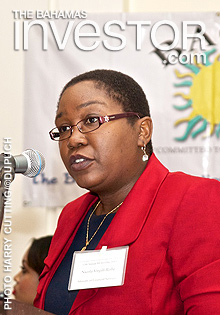| Source: Date: Updated: |
TheBahamasInvestor.com
Thursday, September 19, 2013 Thursday, September 19, 2013 |
Director of Financial Services at the Ministry of Financial Services Nicola Virgill-Rolle speaking at MLRO Day 2013. (Photo Harry Cutting/©Dupuch)
Following the announcement that The Bahamas will follow a Model 1 Intergovernmental Agreement (IGA) when complying with next year’s Foreign Account Tax Compliance Act (FATCA), the Ministry of Financial Services said yesterday that decision was taken to reduce the burden on the private sector and safeguard key sectors such as trusts and funds.
In complying with FATCA, Governments can follow two reporting models. The Model 1 IGA allows for Foreign Financial Institutions (FFIs) to disclose the necessary information on their US clients to their government which, in turn, is then passed on by that government to the US Treasury. A Model 2 IGA requires FFIs to report directly to the US Treasury themselves.
In July 2013, the government announced it would adopt a Model 1 IGA after consultation with an advisory working group and various representatives from the financial services industry. According to Director of Financial Services at the Ministry of Financial Services Nicola Virgill-Rolle (pictured), the Model 1 template was chosen because it carried less of an administrative burden, was more advantageous to key areas such as trusts and funds and the cost of compliance would not be as onerous.
In addition, the Model 1 IGA gives government greater autonomy in enforcing penalties for non-compliance as those would be determined by domestic law.
In developing its response to FATCA, which will become law next year, The Bahamas has worked closely with the US Treasury and the IRS. “We feel we have built a very good and very meaningful relationship with the US Treasury and the IRS,” said Virgill-Rolle who spoke at yesterday’s Money Laundering Reporting Officers (MLRO) Day held at the British Colonial Hilton, Nassau. “We have been very transparent and clear about what we do.”
The government is currrently drafting legislation to implement FATCA and is drawing up industry guidelines. It hopes to release the former by the end of the year and the latter in February 2014. An electronic reporting system is expected to be in place by summer 2014.
“We feel that the future is bright. We see FATCA as something that has some advantages for us,” said Virgill-Rolle. “Tax compliant structures are the way of the future [and] we have a strong compliance environment.”












